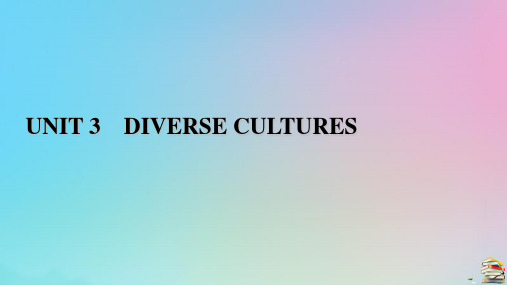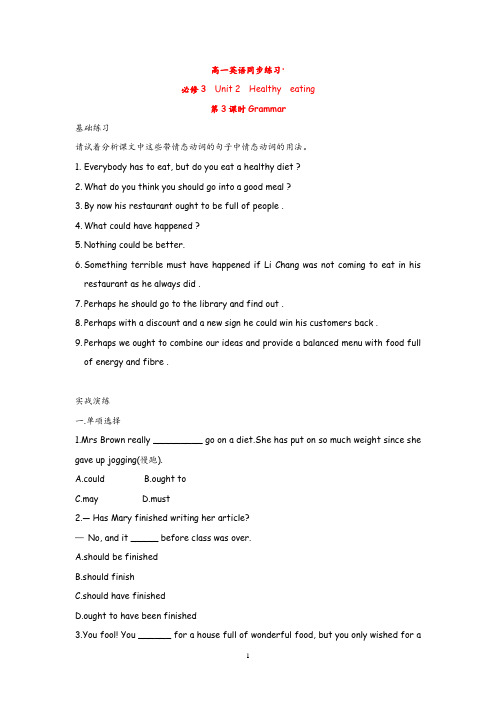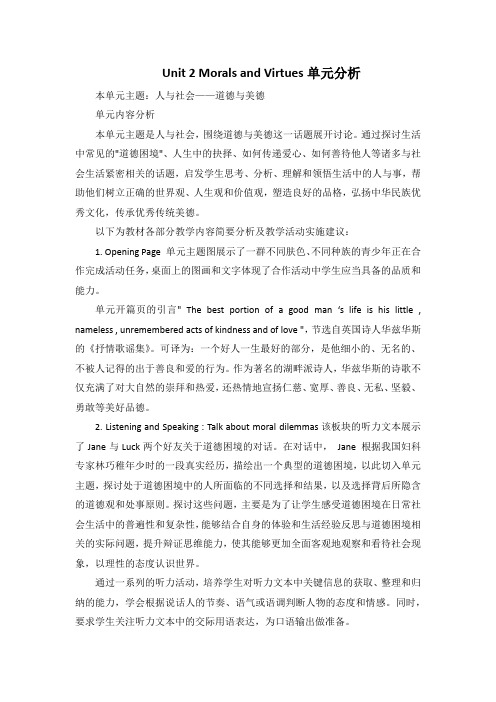英语人教版必修三 Unit 2 Grammar
新教材2023年高中英语 Unit 3 Section Ⅱ课件 新人教版必修第三册

—I won’t join them. ——我不和他们一起。 —Why(will you not join them)? ——为什么(你不和他们一起)?
6.动词不定式 —Are you going there? ——你打算去那里吗? —Yes,I’d like to(go there). ——是的,我想(去那里)。 —I saw her enter the classroom. ——我看见她进了教室。
2.简洁实用 (I’m) Coming. (我)来啦。 (It) Doesn’t matter. (它)不要紧。 3.句法允许 He got up at six(o’clock). 他六点(钟)起床。 This dictionary costs seven(dollars) thirty(cents). 这本词典的费用是7美元30美分。 What a hot day(it is)! 多热的天呀!
UNIT 3 DIVERSE CULTURES
Section Ⅱ Discovering Useful Structures
单元语法精析 语法专题练习
单元语法精析
知识概览
Grammar——省略
探究发现 ①And what a city(it is)—a city that was able to rebuild itself after the earthquake that occurred in 1906. ②My hotel is near downtown,in the Mission District,(which is) one of the oldest parts of the city. ③This district used to be a poor area of town,but (this district) is now a centre for art,music,and food. ④(It is) A real mix of cultures here! ⑤What great food (it is)! ⑥(I) Can’t wait!
高中英语必修3人教版同步练习及答案:Unit 2 Healthy eating Grammar

高一英语同步练习:必修3 Unit 2 Healthy eating第3课时Grammar基础练习请试着分析课文中这些带情态动词的句子中情态动词的用法。
1. Everybody has to eat, but do you eat a healthy diet ?2. What do you think you should go into a good meal ?3. By now his restaurant ought to be full of people .4. What could have happened ?5. Nothing could be better.6. Something terrible must have happened if Li Chang was not coming to eat in his restaurant as he always did .7. Perhaps he should go to the library and find out .8. Perhaps with a discount and a new sign he could win his customers back .9. Perhaps we ought to combine our ideas and provide a balanced menu with food full of energy and fibre .实战演练一.单项选择1.Mrs Brown really _________ go on a diet.She has put on so much weight since she gave up jogging(慢跑).A.couldB.ought toC.mayD.must2.— Has Mary finished writing her article?—No, and it _____ before class was over.A.should be finishedB.should finishC.should have finishedD.ought to have been finished3.You fool! You ______ for a house full of wonderful food, but you only wished for acake.A .could wish B.could have wished C.can wish D.may wish4.What is the way George thought of ______ enough money to buy the house?A.to getB.gettingC.having gotD.being got5.—What do you think of his opinion?—None has given me ___________ piece of advice.A.a betterB.a bestC.the bestD.the better6.— Which is ___________, China or Russia?—Russia is ___________ than China, I think.rger; largerB.the largest; largerC.the lager;the largerD.the larger; larger7.I thought I was going to fail the exam, but I passed _______.A.above allB.after allC.in allD.first of allst summer holiday, I went back to my hometown, ________ the neighbours and the house ________ I used to be familiar with were gone.A.only finding; whichB.only to find; thatC.to find; whomD.found; that9.—Let’s go to a movie after work, OK?— _____________A.Not at all.B.Why not?C.Never mind.D.What of it?10.Nuclear science should be developed to benefit the people ______ harm them.A.more thanB.rather thanC.other thanD.better than11.—Didn’t you enjoy the performance last night?—___________.It was less wonderful than expected.A.Yes, I didB.No, I didn’tC.Yes, I didn’tD.No, I did12.Thi s project ________ considered thoroughly, and I’m sure it ________ finished on time.A.must be; may beB.should be; can beC.may be; must beD.can be; should be13.I was really anxious about you.You _______ home without a word next time.A.mustn’t leaveB.shouldn’t have leftC.couldn’t have leftD.needn’t leave14.It was very kind of you to do the washing-up, but you ________ it.A.mustn’t have doneB.wouldn’t have doneC.mightn’t have doneD.didn’t have to do15.It was ______ that they all went swimming in the river.A.such a hot weatherB.such hot weatherC.so hot weatherD.so hot a weather二.单句改错1.They mustn’t have been in the library because I saw them on the playground .2.At last he could finish the work ahead oftime .3.What a terrible weather we have been having !4.My brother left the school at the age of fifteen ,so he hasn’t much knowledge .5.Thought it was very cold ,but he went out without an overcoat .6.His book is different from me .三.句式变换根据A句句义,完成B 句, 使句义相同或相近。
英语人教版高中必修三(2019新编)-2

普通高中英语(2019版)必修第三册Unit 2 Morals and Virtues 教学设计Period 3 Discovering Useful Structures该板块的活动主题是“描述人物的行为”( Describe people's actions)。
无论是谈论道德规范还是人物的美德品质,往往都需要通过故事来展现,因为只有对人物的言行进行生动而细致的描写,才能深入地刻画人物的性格、品质和精神。
动词-ing形式作宾语补足语和状语都可用于描述人物的行为。
因此,本单元选择该核心语法结构是由单元主题引领下的语篇题材和体裁特点决定的。
1. Able to understand the function and meaning of the adverbial and object complement in the -ing form;2. Can use the -ing form to describe the behaviors, actions, causes, objectives, results and accompanying conditions of the characters;3. Master the meaning and usage of the vocabulary in this part.Importance:1. Guide the students to understand the function and meaning of -ing form as object complement and adverbial;2. Guide the students to correctly use the -ing form to describe the behaviors, actions, causes, objectives, results and accompanying conditions of the characters.Difficulties:1. Correct use of the -ing form as an object complement and an adverbial in context;2. Use the -ing form correctly to describe a person's actions, actions and experiences.1. Review the use of the -ing form as attributive and predicate;2. Read the text in advance to understand the function and meaning of the -ing form as an object complement and an adverbial.3. Understand new words in context.Step 1 Revision1.Ss read the following sentences and discuss the meaning and grammatical function of the italic -ingform in the sentence, and summarizes the usage of the -ing form as attribute and predicate.*We are not allowed to speak aloud in the reading room.*There is a swimming pool in our school.*Her job is keeping the lecture hall as clean as possible.*Her duty is taking care of the babies.2.T shares the meanings and functions of the -ing form in each sentences.The first two sentences: The -ing form is an attribute.The last two sentences: The -ing form is used as a predicate.Step 2 Learning new grammarActivity 11. Group observation and discussion.Students read and observe the three sentences in activity 1. Groupsdiscuss the grammatical function of the -ing form in the three sentences.As the attribute:As the adverbial: 1、2As the object complement: 3As the predicative:2. Look for other sentences in the passage that contain the -ing form of the verb and are used as anobject complement or adverbial.①To a person nothing is more precious than their life,and if they entrust me with that life,how could Irefuse that trust, saying I’m cold,hungry,or tired? (As the adverbial.)②At times she was even seen riding a donkey to faraway villages to provide medical care. (As theobject complement.)③The new People’s Republic of China saw Dr Lin Qiaozhi playing a key role. (As the objectcomplement.)④Though Lin Qiaozhi never married,she was known as the “mother of ten thousand babies”,havingdelivered over 50,000 babies in her lifetime. (As the adverbial.)Step 3 PracticeActivity 21. Students complete activity 2, discuss the content in pairs, and then check the answers.Read thecomplete sentence and explain the grammatical function of the sentence.(Check the answers:1.Hearing; 2.worrying; 3.wanting; 4.knocking; 5.Facing; 6.Returning; 7.smiling;8.Feeling )2. The teacher asks the students to complete the grammar activity 1 on page 68 of the exercise book topractice the meaning and grammar function of the -ing form of the verb.(Check the answers:1. tiring, tiring; 2.shocking; 3.listening; 4.playing; 5.interesting, interested;ing,shouting,lying )Step 4 Summarizing一、动词-ing形式作状语动词-ing形式作状语时,可以表示时间、原因、结果、条件、方式或伴随动作。
人教版高一英语必修3宾语从句与表语从句详细讲解及练习

Grammar 宾语从句与表语从句名词性从句在复合句中起名词作用的从句叫做名词性从句。
名词性从句的作用相当于名词,因此主语从句、表语从句、宾语从句和同位语从句分别作主句的主语、表语、宾语和同位语。
主语从句:Who will win the match is still unknown.宾语从句:I want to know what he has told you.表语从句:The fact is that we have lost the game.同位语从句:The news that we won the game is exciting.引导名词性从句的连接词可分为三类:连接词(不充当从句的任何成分):that ,whether ,if连接代词:what, who, whom, whose, which, wh+ever连接副词:when ,where ,how ,whyObject Clauses 宾语从句请对应写出句子成分I know him.()()()I know who he is.()()()请用横线画出下面句子的宾语从句部分。
1、I know him.2、Do you have the time?3、I think that she is beautiful.4、Why don’t you pay attention to me?总结:宾语通常位于谓_____________或者_____________后一、宾语从句的概念:宾语从句在复合句中作主句的宾语。
位置:通常放在主句谓语动词(及物动词)或介词之后。
句子结构:主句+连词(引导词)+ 宾语从句e.g. She asked if these answers were right.We can learn what we do not know.He will talk to us about what he saw in the U.S.A.I don’t know where we will hold the meeting.通过观察,我们可以知道宾语从句的语序用陈述语序:连接词+主语+谓语+其他成分练习:1)Could you tell me______.A. you will get here whenB. when will you get hereC. get here when you willD. when you will get here2) Mother asked his son what ______for lunch at school.A. did he hadB. does he hadC. he hasD. he had3) Pointing to the young plant, he asked me ____ that was the one we had seen in the picture.A. whatB. ifC. whereD. how二、连接词1、从属连接词(不充当从句的任何成分):that ,whether ,if1)、I hear (that) he will be back in an hour.2)、I want to know if /whether he will go to the park with us注:1、由that 引导的陈述句性的宾语从句,在很多动词如say, think, wish , hope, see, believe, agree, expect, hear , feel等动词后。
人教版高中英语必修三全套教案

Module3 Unit 1 Festivals around the worldTeaching aims and demands1.topic: 1>Festivals2> how festivals begin3>how to celebrate festivals2.function: 1>RequestEg: Could you please…?Could I have …? I look forward to doing…2>ThanksEg: It’s a pleasure. /Don’t mention it.It’s very kind of you to…I’d love to …Thank you very much./Thanks a lot.You are most welcome.3.vocabulary:4.grammar:Jin can speak English well. (ability)Could you please show me the way to …? (request)May we see the awards for the team? (permission)She might give you … (possibility)The whole family will come for dinner. (promise)Often he would dress up like a rich man. (pass habit)We would be there with our friends. (promise)II.Key pointsPeriod 1-2 Warming up and fast reading1.Greetings2.Warming upStep 1 discussing the following questionsa.How was your holiday/spring festival?b.Did you go traveling?c.How much pocket money did you get?Step 2 talking1). Name some festivalsSpring Festival Dragon Boat Festival Lantam Festival Mid-Autumn Festival Army Day May Day Teachers’ Day New Year National Day Mother’s Day Children’s Day Father’s D ay Christmas Day Halloween carnival Easter Valentine Day Oben2).Ss work in groups of four and list five Chinese festivals and siscuss when theytake place , what they celevrate and one thing that people do at that time. Festivals Time of year/date Celebrate for Things to do Mid-Autumn DaySpring FestivalDragon Boat DayTomb sweeping DayLantern Festival3.Pre-reading1) What’s your favourite holiday of the year? Why?2) What festivals or celebration do you enjoy in your city or town? Do you likespending festivals with your family or with friends? What part of a festival do you like best—the music, the things to see, the visits or the food?4. Fast reading and find the answers to the following questions.A.What did ancient festivals celebrate?B.What are festivals of the dead for ?C.Why are autumn festivals happy events ? three things people do at spring festival ?Period 3-4 Intensive reading1.Read the passage paragraph and find the main ideas of each paragraphParagraph 1: All kinds of celebration in ancient time.Paragraph 2: The purpose to honour the dead and three examplesFestivals Time Things people doObenDay of the DeadHalloweenParagraph 3: The reasons Why we honour peopleFestivals Who does it celebrate ?Dragon Boat FestivalsClumbus DayIndian National FestivalParagraph 4: Autumn festivals are happy eventsParagraph 5: How people celebrate in spring festivals2.Language pointsa.They would starve if food was difficult to find…starve (v.)饿死;挨饿eg. Millions of people starved to death during the war.Starve for sth 渴望…Eg. The homeless children starve for love.Starvation (n.) 饿死Eg. Die of starvationStarvation wages 不够维持基本生活的工资b.The most ancient festivals would celebrate the end of the cold weather, plantingin spring and harvest in autumn.Celebrate (vt./vi.) 庆祝,赞颂,赞美,举行(仪式)Eg.We celebrate the new year with a party.Their courage was celebrated in all the newspaper.Celebrated (adj.) = famous 著名的,驰名的c. …because they thought these festivals would bring a year of plenty.days/years/…of plenty :富裕(尤指事物和钱)的日子,年月,生活等。
新人教高中英语必修三Unit2 Morals and Virtues单元分析

Unit 2 Morals and Virtues单元分析本单元主题:人与社会——道德与美德单元内容分析本单元主题是人与社会,围绕道德与美德这一话题展开讨论。
通过探讨生活中常见的"道德困境"、人生中的抉择、如何传递爱心、如何善待他人等诸多与社会生活紧密相关的话题,启发学生思考、分析、理解和领悟生活中的人与事,帮助他们树立正确的世界观、人生观和价值观,塑造良好的品格,弘扬中华民族优秀文化,传承优秀传统美德。
以下为教材各部分教学内容简要分析及教学活动实施建议:1. Opening Page 单元主题图展示了一群不同肤色、不同种族的青少年正在合作完成活动任务,桌面上的图画和文字体现了合作活动中学生应当具备的品质和能力。
单元开篇页的引言" The best portion of a good man ‘s life is his little , nameless , unremembered acts of kindness and of love ",节选自英国诗人华兹华斯的《抒情歌谣集》。
可译为:一个好人一生最好的部分,是他细小的、无名的、不被人记得的出于善良和爱的行为。
作为著名的湖畔派诗人,华兹华斯的诗歌不仅充满了对大自然的崇拜和热爱,还热情地宣扬仁慈、宽厚、善良、无私、坚毅、勇敢等美好品德。
2. Listening and Speaking : Talk about moral dilemmas该板块的听力文本展示了Jane与Luck两个好友关于道德困境的对话。
在对话中,Jane 根据我国妇科专家林巧稚年少时的一段真实经历,描绘出一个典型的道德困境,以此切入单元主题,探讨处于道德困境中的人所面临的不同选择和结果,以及选择背后所隐含的道德观和处事原则。
探讨这些问题,主要是为了让学生感受道德困境在日常社会生活中的普遍性和复杂性,能够结合自身的体验和生活经验反思与道德困境相关的实际问题,提升辩证思维能力,使其能够更加全面客观地观察和看待社会现象,以理性的态度认识世界。
译林版高中英语必修三Unit2 Grammar and usage 教案

《英语》(必修·第三册)Unit 2 Natural disastersGrammar and usageI. Learning objectivesBy the end of the lesson, students will be able to:1. understand the functions of to-infinitives as attributives and adverbials of result;2. use to-infinitives as attributives and adverbials of result properly in different situations;3. rewrite a passage using to-infinitives.II. Key competence focusUse to-infinitives as attributives and adverbials of result correctly and properly.III. Predicted area of difficulty1. Use to-infinitives as attributives and adverbials of result in new situations.2. Rewrite a passage using to-infinitives.IV. Teaching proceduresStep 1 Lead-inT: Hello, everyone. Last period we read two news reports about the lucky escapes from two natural disasters. First, I’d like to show your some sentences in these two news reports.•Alice Brown, head teacher at Falmont Primary School, was teaching when the floor began to shake.•The moment the shaking stopped, Miss Brown sensed it was the best time for the class to make their escape.•She signalled to her students to exit the classroom in an orderly line covering their heads with their hands.•The kids were calm enough to protect themselves during the earthquake.•“We practise earthquake safety procedures twice a year,” said Miss Brown, “so the kids were calm enough to protect themselves during the earthquake.”T: In all these sentences, there’re to-infinitives used as different sentence elements. In today’s class, we will explore the rules concerning to-infinitives as attributives and adverbials of result and learn to use them in different situations.【设计意图:学生在初中阶段已经接触过动词不定式的一部分用法,所以先在学生相对熟悉的语境中呈现含有动词不定式的句子,然后再呈现新的语法知识——动词不定式作定语和结果状语,用这个方法帮助学生建立新旧知识之间的联系,从而顺利过渡到新知识的学习。
人教版必修三 Unit 2 Reading for Writing

7. The girl pushed the stone with all her might. with all one’s might: with all the strength and power 全力以赴地,竭尽全力地
e.g. *He fought back with all his might. 他倾尽全力反击。
6. The king was in despair. despair n. a feeling that you have no hope at all 绝望 in despair 处于绝望中 e.g. A person is most disappointed when he is in despair. 一个人在绝望时最失望。 despair vi. to feel that there is no hope at all 绝望,感到无望 despair of doing sth / despair of sb e.g. *Despite his illness, Ron never despaired. *The teachers began to despair of him. *They’d almost despaired of finding the child.
young girl moving the stone to
the side of the street
tired, surprised
Response
went away
limped away in tears
nobody made an attempt to move the stone wanted to find the owner of the gold
- 1、下载文档前请自行甄别文档内容的完整性,平台不提供额外的编辑、内容补充、找答案等附加服务。
- 2、"仅部分预览"的文档,不可在线预览部分如存在完整性等问题,可反馈申请退款(可完整预览的文档不适用该条件!)。
- 3、如文档侵犯您的权益,请联系客服反馈,我们会尽快为您处理(人工客服工作时间:9:00-18:30)。
不同的“肯定”程度可按下列层次排列:
He is at home. (事实) He must be at home.(非常肯定的推断) He could be at home.(很可能) He ought to be at home.(很可能) He may be at home.(仅仅可能而已) He might be at home.(或许, 非常不确定) He couldn’t be at home.(很可能不在家) He can’t be at home.(一定不在家) He isn't at home.(事实)
4.--Is John coming by train?
--He should, but he ____ not. He
likes driving his car.
泰坦尼克号应该是部好电影。 Titanic _s_h_o_u_ld_ be a good movie.
We know if we keep at it we _s_h_o_u_l_d_ succeed. 我们知道如果我们坚持 下去就应该会成功。
冬天的时候,我们不得不 穿上温暖的衣服。 We _h_a_v_e_t_oput on warm clothes in winter.
How dare you to say such a thing?
He daren’t to speak English before such a crowd, did he?
He daren’t speak English before such a crowd, dare he?
表示推测——情态动词的重要用法
+V.
can’t/
couldn’t
+ V./+ be doing
对过去 + have done
疑问的
推测
+ V.
can/could
+ V./+ be + have done doing
在不表示推测的情态动词中, 我们要注 意以下方面的问题:
1. 表示能力、许可的情态动词的用法。 2. 表示否定的情态动词的用法。 3. shall 和 will 的多种意义的区别。 4. 情态动词短语的使用。 5. 虚拟语气中情态动词的使用。
5. 用于虚拟语气的情态动词: should might could would needn’t ought to
1. I thought you _____like something
to read, so I have brought some
books.
A. may
B. might
C. would
That was why he dared do so. 那就是他为什么敢这样做的原因。
Mother dare(d) not tell father she‘d given
away his old jacket. 母亲不敢告诉父亲她把他的旧上衣送人了。
dare后通常不接动词的进行式。
判断正误:
Nobody need to be afraid of catching the disease. Nobody need be afraid of catching the disease.
These dishes need be cleaned carefully. These dishes need to be cleaned carefully. These dishes need cleaning carefully.
How dare you say such a thing?
You _h_a_v_e__to_ mix the flour and the butter. 你必须把面粉和黄油和在一起。
In England traffic _m_u__st_ keep to the left. 在英国,车辆必须 靠左行驶。
All passengers _m__u_s_t_ wear seat belts. 所有乘客都必须系安全带。
1. 表示能力、许可的情态动词的用法。 表示能力: can, could, be able to be able to 能用于各种时态。 can / could 只能表示现在或过去的能力。
was / were able to 设法做成某事
相当于 managed to do sth.
succeeded in doing sth.
We must dare to think, speak and act. 我们必须敢想、敢说、敢做。
I wonder how he dares (to) say such things. 我纳闷他怎么竟敢说出这样的话来。
dare的过去式问题 情态动词dare可以有过去式dared,但也可 以直接用dare表示过去式,或后接动词完 成式。如:
ቤተ መጻሕፍቲ ባይዱeed / dare
情态动词 (+动词原形)
1.无人称和数的变化; need 2.尤其用于:
*否定句及疑问句中;
*在if/whether之后; .
*或与hardly, never,
dare
no one, nobody连用; 3.常以needn’t 和daren’t
的形式出现;
4.dare有其过去时dared.
3. 情态动词shall, will 的多种意义:
shall / will+ 动词原形: 均可表示将来。 过去时为 should, would。 shall 可表示必须、命令、警告或征询意见。 will 可表示意愿、常出现的动作、在疑问 句中表示请求和建议。
4. 情态动词短语的使用: would like to do… would rather do… would rather + 从句 would prefer to do... had better do...
Unit 2
Modal Verb II
Fill in the blanks according to the Chinese.
我认为她应该向公众道歉。 I think she o_u_g_h__t _to_ apologise to the public.
You _o_u_g_h_t_t_o_ go and see the doctor. 你应当去找医生看看病。
情态动词 对将来 对现在 对过去
肯定的
推测 must
+ V. 常见 + V./+ be + have done must be doing
可能的 + V. 推测
+ V./+ be + have + doing done
may/might 可以用not表示“可能不”
情态动词 对将来 对现在
否定的
推测
表示许可: may / might, can / could might, could 比较委婉, 一般多用于疑 问句。 can, may 表达的语言比较随便。 在以could, might 表示征询对方意见 或表示请求时,回答应相应使用can, may。
2. 表示否定的情态动词的用法: 部分情态动词的否定式是情态动词中的 考点之一。 mustn’t 不准; 禁止 needn’t 没必要 ( = don’t have to ) can’t 不能; 不可能 may not 不可以; 可能不 shouldn’t 不应该 ( = ought not to )
上面的空你都填对了吗? 如此多的情态动词, 我们应当如何使用呢? 接下来就进行详细 的讲解。
ought to/should
should 和ought to 都为“应该”的意思, 可用于各种人称。ought to 的语气稍重 一些。 You ought to (should) follow your teacher’s advice.
行为动词
多用于肯定句;
(sb.) need to do dare to do
need to be done need doing
注意对need问句的回答: --Need I finish the work today? --Yes, _y_o_u__m_u_s_t________.
No, _y_o_u__n_e_ed__n_’t______. No, _y_o_u__d_o_n_’t__h_a_v_e_t_o_. needn’t 对其它情态动词的回答: --Shall I tell John about it? --No, you _n_e_e_d_n_’t__(d_o_n_’_t_h_a_v_e__to_)__. --Must we do it now? --No, you n_e_e_d_n_’_t_(_d_o_n_’_t_h_a_v_e_t_o_)__.
I daren’t ask her for a rise. 我不敢要求她加薪。
dare用作实意动词时意为“敢于”,可以 有各种词形变化,可用于各类句型(肯定 句、否定句、疑问句及各类从句等),其 后多接带 to 的不定式,有时 to 也可省去 (尤其是在否定句或疑问句),可用于非 谓语形式,完成时态等。如:
禁止,意思是“不能, 不许”。如: —Must I finish the task right now?
我现在必须完成这个工作吗? —Yes, you must. / Yes, you have to.
是的。 (—No, you needn’t. / No, you don’t
have to. 不, 不必。)
dare可用实意动词和情态动词,用作情 态动词时,意思是“敢”,其后接动词 原形,通常只用于否定句或疑问句以及if 或whether之后,一般不用于肯定句。如: Dare you tell her the truth? 你敢告诉她事实真相吗?
